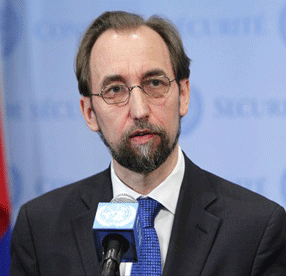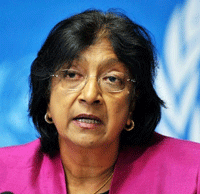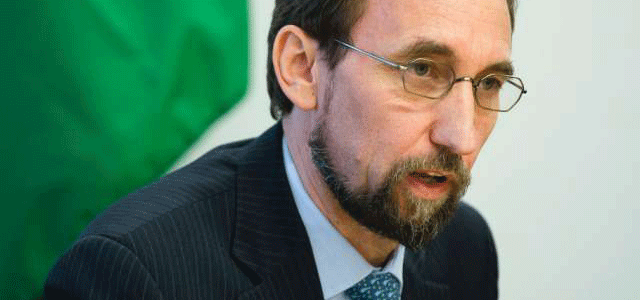 Secretary General Ban Ki-moon announced Friday that he will nominate Jordan’s Prince Zeid Ra’ad al-Hussein to succeed Navi Pillay as the next UN High Commissioner for Human Rights. Pillay will leave office on 31 August, after a single full term and a controversial two year extension.
Secretary General Ban Ki-moon announced Friday that he will nominate Jordan’s Prince Zeid Ra’ad al-Hussein to succeed Navi Pillay as the next UN High Commissioner for Human Rights. Pillay will leave office on 31 August, after a single full term and a controversial two year extension.
Zeid’s selection followed consultations by Secretary General Ban with the permanent members of the Security Council, the heads of the United Nations’ regional groups and two interviews with the candidates for the post. Several names had been rumored to be under consideration, including Marzuki Darusman, who wrote stinging reports on human rights violation in Sri Lanka and North Korea. The nomination will go to the UN General Assembly this summer and will almost certainly be approved by consensus or acclamation.
Prince Zeid will be the first Asian and the first Arab to head the Office of High Commissioner for Human Rights. The post was created through General Assembly resolution 48/191 in 1993 and functions as the top human rights post in the UN system. As Commissioner, Zeid will report directly to the Secretary General.
He served as Jordan’s ambassador to the United Nations until this past April. Given that Jordan began a two-year term on the UN Security Council in January and Zeid has been outspoken on human right concerns during those four months, his resignation sparked rumors that he was being considered for the post.
Zeid previously served as his country’s ambassador the United States and Mexico. From 2002 to 2005, he served as the first President of the International Criminal Court’s Assembly of State Parties, overlapping with Pillay’s term as a justice of the Court (2003-2008). He led the informal negotiations on the elements of crimes under the Rome Statute and later chaired the working group on defining aggression as a crime during the Kampala review conference. He had earlier been the advisor to Secretary General Kofi Annan on sexual exploitation in UN peacekeeping and chaired the consultative committee of UNIFEM, one of UN Women’s predecessor agencies. Earlier in his career, he had served as a political affairs officer in the UN peacekeeping mission during the Yugoslavia conflict.
 Pillay has been a thorn in the side of several states from the beginning. Her nomination in 2008 was initially opposed by the United States due to her views on abortion rights, and her position on the Israel/Palestine disputes led the U.S. to only support her re-appointment to a truncated two-year term. She directly accused Syrian President Bashir al-Assad of commiting war crimes after a 33-month investigation and called for its referral to the International Criminal Court. She has likewise called for an investigation into alleged war crimes committed by the Sri Lankan government during that country’s civil war and reported continued oppression of Tamils and religious minorities. This week, she spoke out against the Chinese crackdown on Tiananmen Square protestors 25 years ago, the highest ranking UN official to comment on the anniversary.
Pillay has been a thorn in the side of several states from the beginning. Her nomination in 2008 was initially opposed by the United States due to her views on abortion rights, and her position on the Israel/Palestine disputes led the U.S. to only support her re-appointment to a truncated two-year term. She directly accused Syrian President Bashir al-Assad of commiting war crimes after a 33-month investigation and called for its referral to the International Criminal Court. She has likewise called for an investigation into alleged war crimes committed by the Sri Lankan government during that country’s civil war and reported continued oppression of Tamils and religious minorities. This week, she spoke out against the Chinese crackdown on Tiananmen Square protestors 25 years ago, the highest ranking UN official to comment on the anniversary.
 Zeid is likely to follow in Pillay’s footsteps as a formidable critic of governments in regard to their human rights records. In February, he co-authored the Security Council resolution on Syria that condemned the “attacks against civilians by all kinds of prohibited and non-prohibited weapons” and “crimes against humanity” taking place in the conflict. Last year, Prince Zeid joined other diplomats in calling for a boycott of a UN meeting organized by the UN General Assembly President considered by many to simply be a forum to complain about the treatment of Serbs in war crimes tribunals. In April, he used the occasion of the 20th anniversary of the Rwandan genocide to challenge the international community to act on the crisis in Central African Republic, stating that “It is … clear we still do not care enough; not enough to act immediately, overwhelmingly, in those cases where an intervention is needed.”
Zeid is likely to follow in Pillay’s footsteps as a formidable critic of governments in regard to their human rights records. In February, he co-authored the Security Council resolution on Syria that condemned the “attacks against civilians by all kinds of prohibited and non-prohibited weapons” and “crimes against humanity” taking place in the conflict. Last year, Prince Zeid joined other diplomats in calling for a boycott of a UN meeting organized by the UN General Assembly President considered by many to simply be a forum to complain about the treatment of Serbs in war crimes tribunals. In April, he used the occasion of the 20th anniversary of the Rwandan genocide to challenge the international community to act on the crisis in Central African Republic, stating that “It is … clear we still do not care enough; not enough to act immediately, overwhelmingly, in those cases where an intervention is needed.”
Peggy Hicks, the global advocacy director for Human Rights Watch, noted that Zeid will be challenged “to speak frankly about the record of silencing civil society, crushing peaceful protests, which is endemic” in the Middle East.
Zeid was a candidate for UN Secretary General along with Ban Ki-moon in 2006. He ran on a platform of “A 21st Century United Nations,” in which he outlined five core principles which he felt would allow the organization to respond the crises more effectively. His late entry into the race cost him political momentum and his candidacy quickly sank. During the first color-coded straw poll, his candidacy was “discouraged” by one of the permanent members and he soon withdrew.
If Zeid serves the customary two four-year terms, he will be the United Nations’ top human rights officer until 2022.
His successor as Jordan’s ambassador to the United Nations will be Dina Kawar, who will be the sixth female member currently serving on the Security Council, a record for the body.

